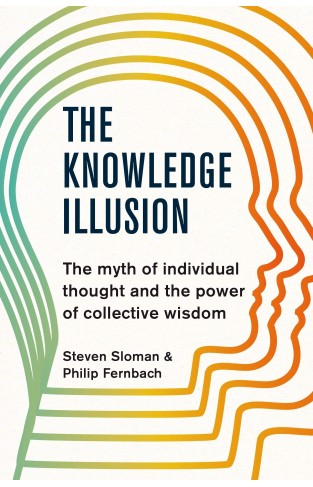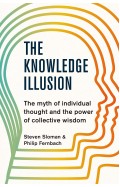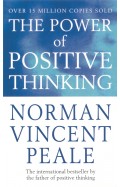The Knowledge Illusion: The myth of individual thought and the power of collective wisdom
By: Steven Sloman
-
Rs 2,205.75
- Rs 2,595.00
- 15%
You save Rs 389.25.
Due to constant currency fluctuation, prices are subject to change with or without notice.
Human reasoning is remarkably shallow - in fact, our thinking and justifications just scratch the surface of the true complexity of the issues we deal with. The ability to think may still be the greatest wonder in the world (and beyond), but the way that individuals think is less than ideal. In The Knowledge Illusion, Sloman and Fernbach show that our intelligence resides not in individual brains but in the collective mind. To function, individuals rely not only on knowledge that is stored within our skulls but also on knowledge stored elsewhere, be it in our bodies, in the environment or especially in other people. Put together, human thought is incredibly impressive, but at its deepest level it never belongs to any individual alone.
And yet the mind supports the most sublime, incredible phenomenon of all: consciousness. How can any of this be possible with a mind that is so imperfect? This is one of the key challenges confronted in this book. The Knowledge Illusion ties together established scientific facts whilst also considering what the mind is for. Understanding why the mind is as it is, and what it is for, will show why we need to consider it as extending beyond our skulls; why we should think about 'the mind' as far more than an extension of the brain but as an emergence from multiple brains interacting. Simply put, individuals know relatively little, but the human hive that emerges when people work together knows a lot.
Human reasoning is remarkably shallow - in fact, our thinking and justifications just scratch the surface of the true complexity of the issues we deal with. The ability to think may still be the greatest wonder in the world (and beyond), but the way that individuals think is less than ideal. In The Knowledge Illusion, Sloman and Fernbach show that our intelligence resides not in individual brains but in the collective mind. To function, individuals rely not only on knowledge that is stored within our skulls but also on knowledge stored elsewhere, be it in our bodies, in the environment or especially in other people. Put together, human thought is incredibly impressive, but at its deepest level it never belongs to any individual alone.
And yet the mind supports the most sublime, incredible phenomenon of all: consciousness. How can any of this be possible with a mind that is so imperfect? This is one of the key challenges confronted in this book. The Knowledge Illusion ties together established scientific facts whilst also considering what the mind is for. Understanding why the mind is as it is, and what it is for, will show why we need to consider it as extending beyond our skulls; why we should think about 'the mind' as far more than an extension of the brain but as an emergence from multiple brains interacting. Simply put, individuals know relatively little, but the human hive that emerges when people work together knows a lot.
The Knowledge Illusion: The myth of individual thought and the power of collective wisdom
By: Steven Sloman
Rs 2,205.75 Rs 2,595.00 Ex Tax :Rs 2,205.75
Zubin Mehta: A Musical Journey (An Authorized Biography)
By: VOID - Bakhtiar K. Dadabhoy
Rs 892.50 Rs 1,050.00 Ex Tax :Rs 892.50
Blitzscaling: The Lightning-Fast Path to Building Massively Valuable Companies
By: Reid Hoffman
Rs 2,545.75 Rs 2,995.00 Ex Tax :Rs 2,545.75
Built to Last Successful Habits Of Visionary CompaniesAI
By: James C. Collins
Rs 4,045.50 Rs 4,495.00 Ex Tax :Rs 4,045.50
Great Soul Mahatma Gandhi And His Struggle With India
By: Joseph Lelyveld
Rs 731.25 Rs 975.00 Ex Tax :Rs 731.25
The Power Of Positive Thinking For Young People
By: Norman Vincen Peale
Rs 2,245.50 Rs 2,495.00 Ex Tax :Rs 2,245.50
Get Real: How To Tell It Like It Is In A World of Illusions
By: Eliane Glaser
Rs 531.25 Rs 625.00 Ex Tax :Rs 531.25
Blitzscaling: The Lightning-Fast Path to Building Massively Valuable Companies
By: Reid Hoffman
Rs 2,545.75 Rs 2,995.00 Ex Tax :Rs 2,545.75
No recently viewed books available at the moment.
Zubin Mehta: A Musical Journey (An Authorized Biography)
By: VOID - Bakhtiar K. Dadabhoy
Rs 892.50 Rs 1,050.00 Ex Tax :Rs 892.50
The Knowledge Illusion: The myth of individual thought and the power of collective wisdom
By: Steven Sloman
Rs 2,205.75 Rs 2,595.00 Ex Tax :Rs 2,205.75
Blitzscaling: The Lightning-Fast Path to Building Massively Valuable Companies
By: Reid Hoffman
Rs 2,545.75 Rs 2,995.00 Ex Tax :Rs 2,545.75














-120x187.jpg?q6)















